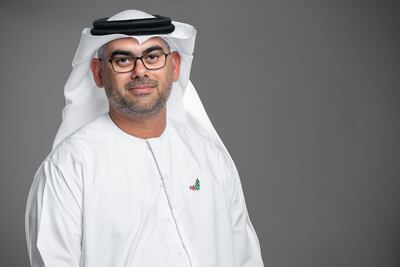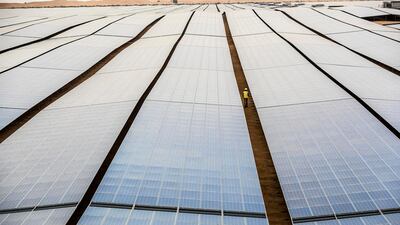Abu Dhabi National Energy Company, better known as Taqa, plans to achieve a 25 per cent reduction in greenhouse gas emissions across its portfolio of assets by the end of this decade.
Taqa is committed to an even bigger 33 per cent reduction of UAE portfolio emissions, compared with the 2019 baseline, by the end of 2030, it said in a statement to the Abu Dhabi Securities Exchange, where its shares are traded.
The move is part of a comprehensive 2030 environmental, social and governance (ESG) strategy unveiled on Thursday, which the company said was a credible step towards achieving its net zero ambitions by 2050.
“We see sustainability as an opportunity and are evolving to become a champion of low carbon power and water,” said Jasim Thabet, group chief executive and managing director of Taqa.
“These are not just targets for the future, they represent actions that we are already taking to deliver meaningful emission reductions and put us on a path towards achievement of net zero by 2050.”
Taqa, one of the largest listed integrated utilities in Europe, Middle East and Africa region by market value, has significant investments in power and water generation, as well as in the oil and gas sector.
It plans to invest Dh40 billion ($10.9bn) in infrastructure development as it looks to add about 27 gigawatts of power capacity by the end of this decade.
Under its 2030 strategy launched last year, the company plans to expand its power-generation capacity in the UAE to 30 gigawatts and its global generating capacity by 15 gigawatts.
It aims to generate more than 30 per cent of its power from renewable sources by 2030, from 5 per cent in 2021.
Taqa said its ESG strategy was in line with the UAE’s broader goals of achieving its net zero ambitions.
The UAE is aggressively pursuing goals to reduce its carbon footprint and was the first country in the Middle East to set a net zero target last year.
The Emirates aims to achieve carbon neutrality by 2050 and plans to invest $160bn in clean and renewable energy sources over the next three decades.
Taqa will continue to invest in the lower carbon alternatives as Cop27 in Egypt and Cop28 in the UAE will turn the focus increasingly to “actions and not just pledges”, Mr Thabet said.
“As a major regional utility, we are determined to play our part without compromising on security of supply,” he said.

The decarbonisation of power and water supply, further electrification across sectors and demand-side management to support efficient use of power and water are at the core of the new ESG strategy, Taqa said.
Built around six pillars — climate change, water and effluents, occupational health and safety, diversity and equal opportunity, local community engagement and corporate governance — the strategy will help the company meet its “quantitative and qualitative ambitions” across focus areas.
Taqa’s international portfolio of assets is spread across Canada, Ghana, India, Iraq, Morocco, Oman, the Netherlands, Saudi Arabia, the UK and the US.
The company is a key player at home in expediting the UAE’s clean energy transition.
The company recently acquired a controlling stake in Masdar’s renewable business, along with Adnoc and Mubadala, which aims to become a global clean energy company with a capacity of more than 50 gigawatts by 2030.
In the UAE, Taqa's projects include the Taweelah A1, Taweelah A2, Shuweihat S1 and Mirfa International power and water plants.
In the renewables sector, the company holds a 60 per cent stake in the 1.2-gigawatt Noor Abu Dhabi solar plant, the world’s largest single-site solar photovoltaic plant.
Taqa is also developing a 2-gigawatt solar plant in Al Dhafra, Abu Dhabi, in partnership with Masdar, France’s EDF Renewables and China’s JinkoPower.


